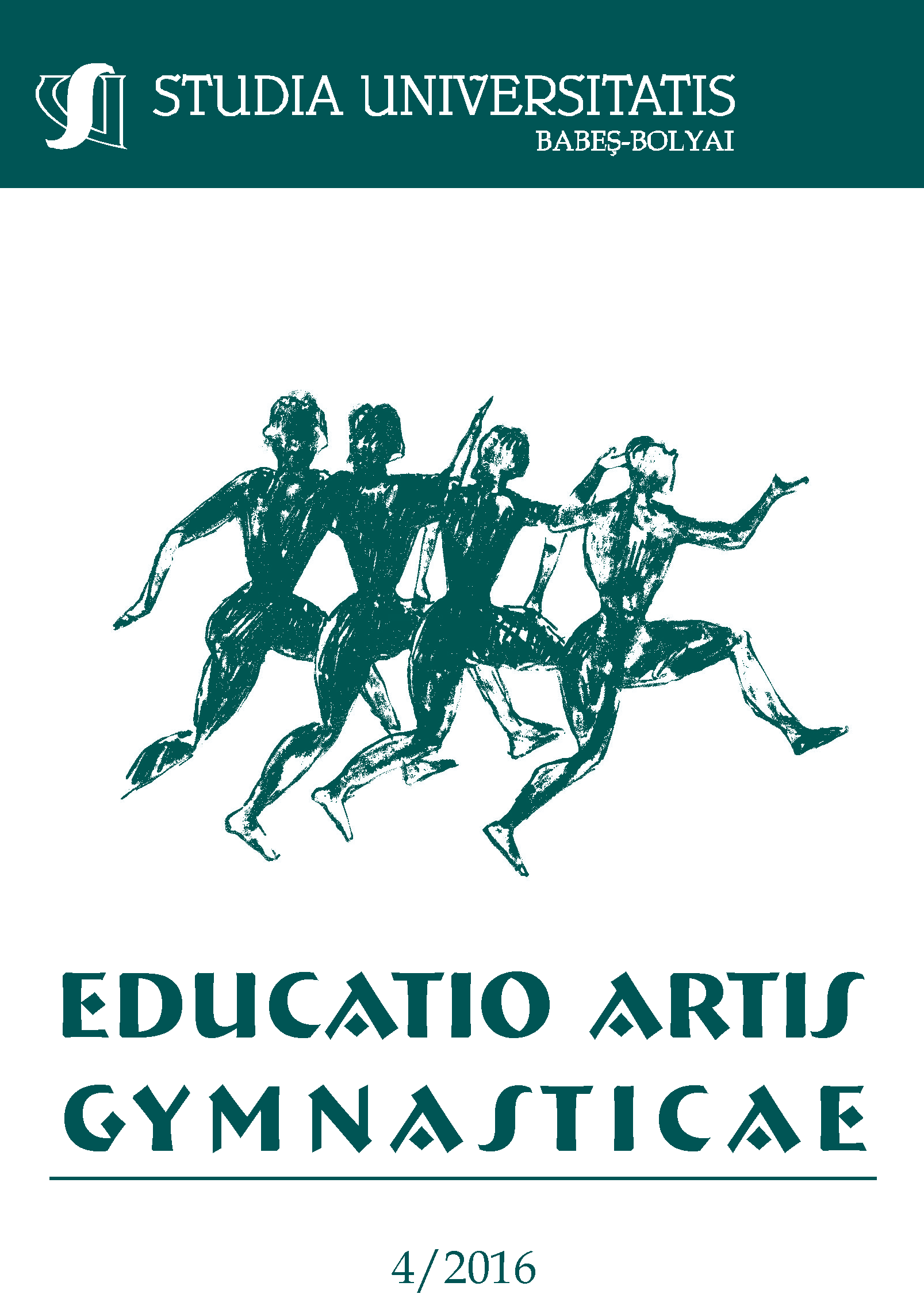PREDICTORS OF ACADEMIC PERFORMANCE
Keywords:
conscientiousness, agreeableness, academic performanceAbstract
Developing capacities and skills necessary for the integration into the labour market and for the achievement of a professional career is a foreground target of the educational system. Within this frame, personality traits and career interests of students who shall pursue a career in education are directly connected to the choices they make, to their plans and achievements equally. This study presents an analysis of the dominant personality traits of the students studying physical education, based on the Big-Five model, based on the results of a quantity-quality descriptive study conducted on 118 students attending the physical and athletic education faculty, as well as the identification of the occupational cluster corresponding to the teaching activity. For the studying of the personality factors we used the NEOPI-R personality inventory, career interests were measured with the JVIS, Jackson Vocational Interest Survey, and the results were correlated with academic performance. As a result of the analysis, we may conclude that the physical education student is both an agreeable and a hard-working person, with a high sense of responsibility, constantly preoccupied for his personal performance.
Predictori ai performanţei academice. Un obiectiv prioritar ale sistemului educaţional îl constituie formarea competenţelor şi aptitudinilor necesare pentru integrarea pe piaţa forţei de muncă şi realizarea carierei profesionale. În acest context, trăsăturile de personalitate și interesele vocaționale ale studenților care vor urma o carieră didactică sunt implicate direct în alegerile pe care aceștia le fac, în ceea ce-și propun şi realizează deopotrivă. Studiul de faţă prezintă o analiză a trăsăturilor dominante ale personalităţii studentilor de la domeniul educație fizică și sport, având la bază modelul Big-Five, pe baza rezultatelor dintr-un studiu descriptiv mixt cantitativ-calitativ realizat pe un număr de 118 studenţi de la specializarea educație fizică și sportivă, domeniul de licență, precum și identificarea clusterului ocupațional corespunzător activității de predare. Pentru investigarea factorilor de personalitate am utilizat Inventarul de personalitate NEOPI-R, interesele vocaționale au fost măsurate cu Inventarul de Interese Vocaţionale Jackson, JVIS, iar rezultatele obținute au fost corelate cu performanţa academică, calculată ca medie a anilor de studii corespunzători. Ca rezultat al analizei putem conchide că studentul de la acest profil este deopotrivă agreabil şi conștiincios, cu un simţ al responsabilităţii ridicat în activitatea profesională, preocupat în permanenţă pentru performanţa personală în relaţiile cu sine şi performanţa profesională în relaţiile cu ceilalţi.
Cuvinte-cheie: conștiinciozitate, agreabilitate, performanțe academice
References
Barrick, M. & Mount, M. (1991). The big five personality dimensions and job performance: A meta-analysis. Personnel Psychology, 44, 1-26;
Bozanoglu, I., & Sapanci, A. (2015). The relationships between the big five personality traits and academic motivations levels of Turkish university students. International Journal of Human Behavioral Science, 1 (1), 1-7;
Chi, Nai-Wen, Chang Huo-Tsan, & Huang, Hsien-Lier. (2015). Can personality traits and daily positive mood buffer the harmful effects of daily negative mood on task performance and service sabotage? A self-control perspective. Organizational Behavioral and Human Decision Processes. 131, 1-15;
Costa, P.T., & McRae, R.R. (1992). Normal personality assessment in clinical practice: the NEO personality inventory. Psychol. Assess 4 (1), 5-13;
Costa, P.T., & McRae, R.R. (2009). NEO PI-R. Manual tehnic si interpretativ. Editura Sinapsis, Cluj-Napoca, 260;
Delli D. (2010). Hiring Decisions. In: Kennedy, M, (ed.). Teacher Assessment and the Quest for Teacher Quality (p. 149-162), San Francisco: Wiley.
DeNeve, K. M., & Cooper, H. (1998). The happy personality: A meta-analysis of 137 personality traits and subjective well- being. Psychological Bulletin, 95, 542-575;
DeRaad, B., & Perugini, M. (Eds.).(2002). Big Five Assessement, Hogrefe and Huber Publ., Seattle.
Gomez, R., Gomez, R., & Cooper, A. (2002). Neuroticism and extraversion as predictors of negative and positive emotional information processing: Comparing Eysenck's, Gray's and Newman's theories. trad. Iliescu, D., European Journal of Personality, 16, 333-350;
Grama, B., Botone, D., & Raulea, C. (2016). The psychological profile of the medical student. Acta Medica Transilvanica, 21 (2), 36-39;
Harley, Jason, M., Carter, Cassia, Papaionnou et al. (2016). Examining the predictive relationship between personality and emotion traits and students agent directed emotions: towards emotionally- adaptive agent – based learning environments. Springer Science Business Media Dordrecht.
DOI: 10.100/7s11257-016-9169-7;
Heller, D. Watson, D., & Ilies, R. (2004). The role of person versus situation in life satisfaction: A critical examination. Psychological Bulletin, 130, 574-600;
Jackson, D., Livinti, R. (2007). Jackson Vocational Interest Survey - trad. Iliescu, D. Manual tehnic si interpretativ. Cluj-Napoca, Editura Sinapsis.
Hojat, M., & Zuckerman, M. (2008). Personality and specialty interest in medical students. Med Teach 30:400–406.
Judge, T. A., Heller, D., & Mount, M.K. (2002). Five – factor model of personality and job satisfaction: A meta-analysis. Journal of Applied Psychology, 87, 530-541;
Lounsbury, J. W., Saudargas, R., Gipson, L. et al. (2005). An investigation of broad and narrow personality traits in relation to general and domain specific life satisfaction on college students. Research in Higher Education, 46, (6), 707-729;
Scepansky, J.A., & Bjornsen, C.A., (2003). Educational orientation, NEO PI-R personality traits, and plans for graduate school. College Student Journal, 37, 574-582.
Schaeffer, G., Epting, K., Zinn, T., & Buskit W. (2003), Student and faculty perceptions of effective teaching: A successful replication. Teach Psychol, 30, 133–6;
Shiner, R.L. (2000). Linking childhood personality with adaptation: Evidence for continuity and change across time to late adolescence. Journal of Personality and Social Psychology, 78, 310-325.
Trapmann, S., Hell, B., Hirn, J.O., & Schuler, H., (2015). The meta-analysis of the relationship between the big five and academic success at university. Zeitschrift fuR Psychologie/Journal of Psychology, 215, 132-151;
Tross, S. A, Harper J. P., Osher L.W., et al. (2000). Not just the usual case of characteristics: Using personality to predict college performance and retention. Journal of College Student Development, 41, (3), 323-333.
Downloads
Published
How to Cite
Issue
Section
License
Copyright (c) 2016 Studia Universitatis Babeș-Bolyai Educatio Artis Gymnasticae

This work is licensed under a Creative Commons Attribution-NonCommercial-NoDerivatives 4.0 International License.






